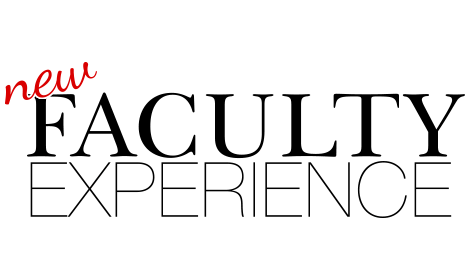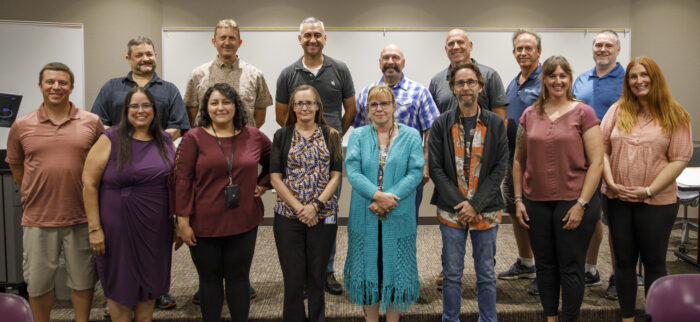New Faculty Experience

Becoming Community
The first-year experience of a full-time faculty member is marked by transitions: the teacher’s focus is continuously expanding to include aspects of the college community that were previously not within view. Mesa Community College’s New Faculty Experience, a year-long series of dialogues and seminars, facilitates these transitions by providing information, activities, and interactions that integrate the new residential faculty member into the life of the college and provide the faculty with valuable knowledge and support to be successful educators.
The New Faculty Experience is the onboarding into Peer Assistance and Review (PAR) program under the direction of the PAR Facilitator that supports first-year Probationary Faculty members in developing sound teaching and learning practices, completing the Individual Development Plan, learning the culture of the College, and understanding the duties, rights, responsibilities, and expectations of being a Residential Faculty member. Participation in the New Faculty Experience begins in the first Fall semester after being hired.
Assumptions
“The model of community we seek is one that can embrace, guide, and refine the core mission of education—the mission of knowing, teaching, and learning.” – Parker J. Palmer
While they are not new to teaching, recently hired full-time instructors are often new to the culture of the college, its administrative structure, support services, academic and professional opportunities, and student life. Moreover, new residential faculty members are often unfamiliar with the Mesa Community College (MCC) dynamic, one that is marked by innovation, service, scholarship, discovery, and community involvement. In order to thrive professionally in the MCC culture, and to provide students with effective learning experiences, new MCC faculty not only must be excellent teachers; they must be informed, acculturated, and actively engaged members of the college community.
New faculty need the time and opportunity to meet formally and informally with colleagues, mentors, and key administrators in order to build relationships and learn the college culture through conversations, activities, and project design and implementation. Their exposure to the diversity and dynamics across the college inspires collegiality and collaboration that can only enhance student success and learning and sustain faculty scholarship in teaching and learning.
Values
“The community . . . far from being linear and static and hierarchical, is circular, interactive, and dynamic.” – PJP
- The processes by which community is created are as valuable as the community itself. In fact, much like teaching and learning, the processes and the product of one’s professional development are integrated and inseparable.
- Promoting and sustaining diversity is an end in itself, but also, it is vital to the health of our aspirations: the community we imagine cannot thrive without diverse points of view; it cannot evolve, in fact, cannot even exist.
- The roles of “participant,” “presenter,” “facilitator,” and “designer” are fluid and interchangeable. Professional hierarchies are temporarily dismantled while administrators, probationary faculty, tenured faculty, and staff engage in the New Faculty Experience. We expect this rearrangement of roles to result in new questions with thoughtful, expansive, novel and, sometimes, unconventional answers that nourish and sustain the Mesa Community College’s focus on learning.
- Academic quality and excellence are paramount at MCC. New faculty can influence, invigorate, and perpetuate the scholarship, knowledge, expectations, and responsibility for more vital and deeper experiences for our communities of learners.
Goals
“This communal dynamic is governed by rules of observation and interpretation that help define us as a community by bringing focus and discipline to our discourse.” – PJP
- To begin the community-building process by sharing and responding to each other’s insights, ideas, concerns, or questions as they arise throughout the year.
- To immerse faculty in the MCC teaching and learning culture by emphasizing opportunities to further the MCC Mission and Strategic Plan.
- To enhance the new faculty member’s understanding of MCC’s support services and administrative structure.
- To encourage the creative, judicious, and relevant use of innovation in teaching and learning.
- To refine understanding of and appreciation for the relationship between nurturing diversity and building community at MCC.
- To encourage the use of teaching methods that accommodate various learning styles.
- To solidify the New Faculty community by encouraging progress in professional development and service.
- To guide faculty through the Individual Development Plan creation and submission
- To educate faculty on duties, rights, responsibilities, and expectations of being a Residential Faculty member
Program Outcomes
- Discover MCC/CD policies, trends, etc.
- Explore and implement new teaching and learning strategies
- Enhance the culture of MCC
- Create and complete the first year Individual Development Plan with all required documentation to address personal and professional growth goals
- Examine college support services for student success
New Faculty Experience Cohort of 2024-2025

